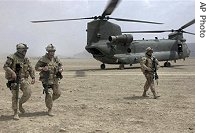2007年VOA标准英语-US, NATO Not Changing Procedures for Protecting
搜索关注在线英语听力室公众号:tingroom,领取免费英语资料大礼包。
(单词翻译)
By Al PessinPentagon
26 June 2007
In the wake of a series of high-profile incidents in which U.S. and NATO attacks have killed Afghan civilians2, a senior American officer with responsibility for both forces says allied3 procedures for avoiding civilian1 casualties are adequate. The officer blames the Taleban for putting the civilians in danger. VOA's Al Pessin reports from the Pentagon.
Speaking via satellite from Bagram Air Base near Kabul, Brigadier General Joseph Votel says the recent incidents involving large numbers of civilian casualties have not resulted in any new procedures.
"No, there's no particularly new procedures that we are using right now," he said. "We think the procedures we have in place are good. They work. They help us minimize the effects on this."
 |
| Canadian soldiers, part of the NATO forces, walk in front of a Chinook helicopter after recapturing Ghorak district from Taleban fighters in Kandahar province, south of Kabul, June 25, 2007 |
"I won't say every instance, but in the large majority of these incidents where we unfortunately do have a civilian injury or death or we cause some damage, in most cases these are caused principally by insurgents5 who are initiating6 activities in the direct proximity7 of villages or where civilians are located," he said.
 |
| Hamid Karzai speaks at press conference at in Kabul, 23 Jun 2007 |
On Tuesday, the U.S. Defense8 Department could not provide figures for the number of Afghan civilians killed in fighting this year. A count by the Associated Press indicates that 203 Afghan civilians died as a result of NATO and coalition operations since January, while Taleban fighters killed 178.
The news agency quotes the United Nations office in Afghanistan as having slightly higher figures, attributing 207 civilian deaths to the foreign forces and 213 to the Taleban. AP also quotes an Afghan group (ABCAR) as counting 230 civilians killed by U.S. and NATO troops, with no figure reported for Taliban killings9.
A senior researcher at Human Rights Watch in New York, John Sifton, says it is difficult to know whether civilian casualties in Afghanistan have increased this year because the level of fighting changes from month to month. But he says the fact that Taleban forces put civilians at risk does not justify10 U.S. or NATO forces unnecessarily endangering those civilians. Still the human rights researcher says it is not reasonable to compare the civilian deaths caused by U.S. and NATO forces to those caused by the Taleban.
"The Taleban is committing violations11 of the Laws of War in almost everything they do," he said. "NATO and the United States, by contrast, is not setting out to violate the Laws of War across the board. However, they're failing to take precautions in a lot of cases, and may occasionally cross the line and violate the Laws of War themselves."
Sifton says Taleban fighters hide among civilians, and even when they attack military targets they do so in civilian areas and use high explosives that are bound to kill many people. He says NATO and U.S. forces are more careful, but he says they still rely too much on highly-destructive air strikes in populated areas.
"NATO, obviously, does take many precautions to avoid civilian casualties," Sifton said. "There's no doubt about it. The concern that we have, and that many human rights activists12 on the ground have, is that they're not doing enough."
In one of the most recent incidents, NATO troops tracking a Taleban force fleeing toward the Pakistan border Saturday fired a rocket that local reports say killed at least nine Pakistani civilians. Pakistan criticized the incident, and said all military activity on its side of the border should be done by its own forces. General Votel defended the rocket strike, saying the commander operated within the established Rules of Engagement.
"In this particular situation, the commander on the ground determined13 that he needed to continue to address that threat until it was eliminated," he said. "And that included firing into areas that were in Pakistan."
The general expressed regret for any civilian casualties in Pakistan and says the results of the attack are being investigated. But he says the Taleban force crossed from Pakistan, attacked a NATO unit and then fled back into Pakistan. General Votel says communications with Pakistani military units are good, and efforts are made to coordinate14 anti-Taliban operations on both sides of the border.




